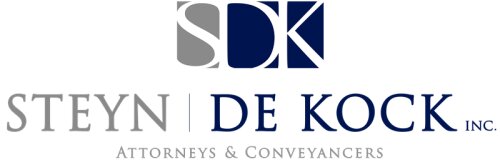Best Mortgage Lawyers in Welkom
Share your needs with us, get contacted by law firms.
Free. Takes 2 min.
Free Guide to Hiring a Real Estate Lawyer
List of the best lawyers in Welkom, South Africa
About Mortgage Law in Welkom, South Africa
Mortgage law in Welkom, as in the rest of South Africa, revolves around the principles of securing a loan for the purchase or refinancing of immovable property, typically a house or land. A mortgage, also referred to as a home loan or bond, is an agreement where the property purchased serves as collateral for the loan. Should the borrower fail to fulfill the repayment obligations, the lender (usually a bank) may repossess and sell the property to recover the outstanding funds. The registration, execution, and enforcement of mortgages are governed by South African legislation, and the process involves various role-players, including attorneys, banks, and the Deeds Office.
Why You May Need a Lawyer
There are several circumstances where seeking legal advice regarding mortgages is critical in Welkom:
- If you are purchasing property and require guidance on the terms and implications of your home loan or bond.
- When a dispute arises with your lender regarding repayment terms or interest rates.
- If you are facing possible repossession, foreclosure, or need assistance negotiating with creditors.
- When you want to understand your rights and obligations under a mortgage agreement.
- If there are disagreements regarding joint ownership or co-signing on mortgages.
- Dealing with deceased estates where property is bonded.
- In cases of divorce or separation affecting shared property and outstanding mortgages.
Local Laws Overview
The mortgage process in Welkom is governed by several statutes and regulatory practices. The most notable include:
- Deeds Registries Act: Regulates registration of mortgages and property in the Deeds Office, a fundamental requirement for validating home loans.
- National Credit Act (NCA): Governs all credit agreements, including mortgages, focusing on responsible lending and consumer protection. The Act sets out rules for affordability assessments, disclosure of terms, and addresses issues such as reckless lending and credit bureau reporting.
- Conveyancing Practice: All property transfers and bond registrations must be managed by qualified conveyancing attorneys in the area, ensuring all legal requirements are met.
- Foreclosure and Repossession: The process for repossessing mortgaged property is subject to certain legal procedures and rights, including judicial oversight, notice requirements, and potential court intervention.
- Interest Rate Regulations: The NCA limits the amount of interest and fees that may be charged by lenders, offering some protection to borrowers.
Frequently Asked Questions
What is a mortgage bond?
A mortgage bond, commonly called a "bond", is a legal agreement whereby a bank or lender provides funds for the purchase of a property, and the property is registered as security for the loan at the Deeds Office.
Who may apply for a mortgage in Welkom?
Generally, anyone over the age of 18 with a stable income and good credit record may apply for a mortgage. Permanent residents and, in some cases, foreigners may also qualify, subject to the bank’s requirements.
What costs are involved in obtaining a mortgage?
Typical costs include bond registration fees, transfer costs, attorney/conveyancer fees, initiation fees, and ongoing interest and administration charges.
How is my affordability assessed?
Banks are required by the National Credit Act to assess your income, expenses, and debt to ensure you can afford your monthly repayments before granting a mortgage.
Can I pay off my mortgage early?
Yes, most South African home loans allow for early repayment, but it's important to check if there are any early settlement penalties or notice periods with your specific lender.
What happens if I can't pay my mortgage?
If you fall behind on payments, your lender will initiate a process that may lead to repossession and forced sale of the property. However, there are legal procedures and you have rights during this process, such as the chance to negotiate or apply for debt review.
What is the role of a conveyancer?
A conveyancer is a specialist attorney who handles the legal aspects of property transfers and bond registration, making sure all documents are in order and registered correctly at the Deeds Office.
Are interest rates on mortgages fixed or variable?
South African mortgages typically offer both options. Fixed rates are set for a specific period, after which the rate may revert to variable, while variable rates fluctuate with market conditions.
Can I transfer my mortgage to another bank?
Yes, you can apply for a bond switch or refinance with another lender, which may offer better rates or terms. Legal and administrative fees will apply.
Is legal advice necessary when taking a mortgage?
While not legally mandatory, consulting a lawyer is strongly recommended to understand your rights and obligations, review contracts, and avoid costly mistakes.
Additional Resources
If you need more information or assistance on mortgages in Welkom, consider contacting or consulting the following:
- South African Deeds Office: For property and bond registration information.
- National Credit Regulator (NCR): For guidance on credit laws and consumer complaints.
- Law Society of South Africa: To find qualified conveyancers and property lawyers in Welkom.
- Major South African Banks: For bond application procedures, calculators, and educational resources.
- Local municipal offices: For rates, clearances, and property-specific queries.
Next Steps
If you are considering taking out a mortgage, facing difficulties meeting payments, or are involved in any legal dispute regarding your property in Welkom, the following steps are recommended:
- Gather all documents: Collect your purchase agreement, existing loan documentation, and any correspondence with your bank or lender.
- Identify your needs: List your concerns, questions, and desired outcome (e.g., new mortgage, dispute resolution, or assistance with a sale).
- Consult a professional: Reach out to a local conveyancer or property lawyer for a consultation. They can review your documents, explain legal jargon, and provide tailored advice based on your circumstances.
- Contact relevant bodies: Engage with your bank, the Deeds Office, or the National Credit Regulator if you have disputes or feel your rights have been violated.
- Keep records: Maintain copies of all communications and agreements, as these may be crucial if disputes escalate to formal proceedings.
Lawzana helps you find the best lawyers and law firms in Welkom through a curated and pre-screened list of qualified legal professionals. Our platform offers rankings and detailed profiles of attorneys and law firms, allowing you to compare based on practice areas, including Mortgage, experience, and client feedback.
Each profile includes a description of the firm's areas of practice, client reviews, team members and partners, year of establishment, spoken languages, office locations, contact information, social media presence, and any published articles or resources. Most firms on our platform speak English and are experienced in both local and international legal matters.
Get a quote from top-rated law firms in Welkom, South Africa — quickly, securely, and without unnecessary hassle.
Disclaimer:
The information provided on this page is for general informational purposes only and does not constitute legal advice. While we strive to ensure the accuracy and relevance of the content, legal information may change over time, and interpretations of the law can vary. You should always consult with a qualified legal professional for advice specific to your situation.
We disclaim all liability for actions taken or not taken based on the content of this page. If you believe any information is incorrect or outdated, please contact us, and we will review and update it where appropriate.









